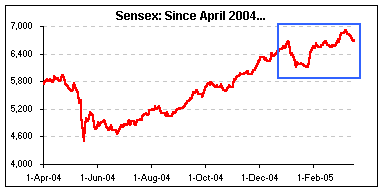After the one-way ride till January 2005, the Indian stocks markets have been too volatile in the past two months.
There have been several variables that have affected the movement of the Indian markets during this period and the ones that gain foremost prominence are -- the Union Budget for 2005-06, rising crude prices and the minutes of the Federal Reserve meeting.

As a result of all this, the retail investor seems to have been caught in a flurry of do's and don'ts with regard to investing in the equity markets. In such times, rather than determining his/her risk capabilities, even the most serious of the investors indulges in 'betting' where will the Sensex be at the end of a particular period, i.e., 'this week', 'this month', or 'this year'.
In this hullabaloo, however, what takes backseat is one of the most fundament rules of sound and safe investing -- discipline.
What stock buyers generally fail to understand is that, apart from the external factors, there is one very big 'risk-factor' that is very inherent (or internal) to them. This internal risk is that of 'indiscipline'.
By indiscipline, we mean that stockbuyers tend to forget the basic scruples of safe and sound investing, as they are then lured by the high probability of earning 'a big bang for their buck'.
And this leads to even the best of investors putting their money into the worst of stocks believing that their invested company is the 'next big thing'. Ironically, as just these very times when stock buyers need to stick to the fundamentals of sound investing, they seem to forget these (the fundamentals).
This is where the 'behavioral' aspect of investing gains importance. And this is the time when a stock buyer, before making the next investment (say investment 'X') should ask himself two basic questions:
Whether he understands his investment 'X' as well as he thinks he does?
What would be his reaction in case his 'correct' analysis about investment 'X' goes wrong?
Now, while the answer to the first question (i.e. whether the stock buyer understands his investment 'X' as well as he thinks he does) would be indicative of the 'confidence' level of the stock buyer, the answer to the second (i.e. what would be his reaction in case his 'correct' analysis about investment 'X' goes wrong) would speak about the 'consequences' in times his investment decision goes wrong.
If the stock buyer has clear answers for the abovementioned questions, he would only make his larger task (of making investment 'X') easier.
Thus, before you (as an investor with a long-term horizon of 2 to 3 years) invest, make sure that you have pragmatically ascertained your probability of being right and as to how would you react to the consequences of being wrong.
Always look at the downside before the upside.
Equitymaster.com is one of India's premier finance portals. The web site offers a user-friendly portfolio tracker, a weekly buy/sell recommendation service and research reports on India's top companies.







 © 2025
© 2025